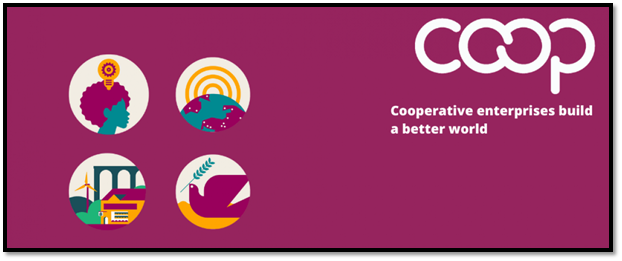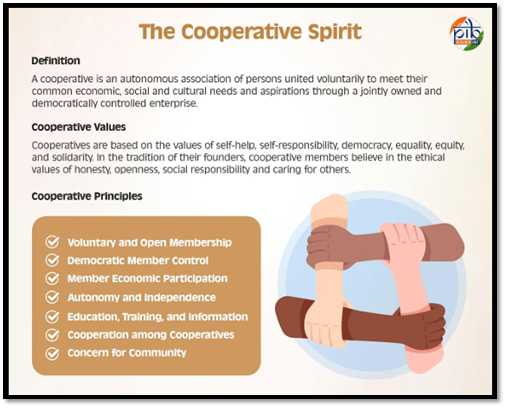Ministry of Cooperation
International Cooperative Alliance
A Pillar for Cooperative Development
Posted On: 24 NOV 2024 9:23PM
The International Cooperative Alliance (ICA) is the global organization that unites, represents, and serves cooperatives around the world.
Founded in 1895, London, England during the 1st Cooperative Congress it is one of the oldest and largest non-governmental organizations, representing 1 billion cooperative members globally.
With approximately 3 million cooperatives across the planet, the ICA serves as the apex body for the cooperative movement, providing a global platform for collaboration, knowledge exchange, and coordinated action. It is the leading voice for cooperatives, advocating for their interests and supporting the sharing of expertise across the sector. The International Cooperative Alliance (ICA) has over 306 member organizations across 105 countries.
Its members include both international and national cooperative organizations representing a wide range of economic sectors, such as agriculture, banking, consumer goods, fisheries, health, housing, insurance, and industry & services.
The International Co-operative Alliance (ICA) first expanded into the Asia-Pacific region with the establishment of the Regional Office & Education Centre for South-East Asia in 1960. This was the result of discussions that had taken place at various ICA Congresses starting in 1948, aimed at bringing the national cooperative movements of developing countries closer to the global cooperative network. The discussions also explored how cooperation could be a tool for social and economic development in these countries.
In 1954, the ICA’s 19th Congress held in Paris passed a resolution highlighting the responsibility of established cooperative movements, particularly in developed countries, to support the cooperative pioneers in underdeveloped countries. The resolution emphasized the role of cooperation in fostering economic growth in these regions and recommended drawing up an actionable program to facilitate the spread of cooperation and provide the necessary financial assistance.
2024 ICA Global Conference
The 2024 ICA Global Conference will mark a historic milestone as it takes place in India for the first time in the event’s 130-year history! The conference will be held in New Delhi, bringing together cooperators from around the globe to explore the role of cooperatives in shaping a collective, peaceful, and prosperous future for all.
The conference theme, "Cooperatives Build Prosperity for All," highlights the people-centered, purpose-driven, and progress-oriented nature of cooperatives.

Role of India in the Development of ICA-Asia Pacific (ICA-AP)
India has been a central figure in the development and success of the International Co-operative Alliance Asia-Pacific (ICA-AP). From the inception of ICA’s regional office in New Delhi in 1960, to its continued influence in the global cooperative movement, India has not only been a key member but also a driving force in shaping cooperative models that have had a profound impact across the Asia-Pacific region.
- Dr. G. Keler’s Exploratory Tour and the Establishment of the ICA Regional Office in India
In 1957, at the behest of ICA, Dr. G. Keler, a Swedish cooperative expert, conducted an exploratory tour across several Asian countries, including India. His mission was to assess the region’s needs for cooperative development and evaluate the potential for ICA’s intervention. Dr. Keler visited countries such as Pakistan, India, Sri Lanka (then Ceylon), Singapore, Malaysia, Indonesia, Burma, Thailand, Hong Kong, Japan, and South Korea, where he engaged in discussions with key stakeholders, including cooperative organizations, governments, and United Nations agencies.
Based on his findings and the consultations that followed at the Kuala Lumpur Conference in 1958, ICA decided to establish its Regional Office and Education Centre in New Delhi, India, marking a crucial step in fostering cooperative development across both South and East Asia.

India’s role as the host nation for the ICA regional office was not only significant due to its geographical location but also because of its commitment to cooperative principles. This decision paved the way for India to become a cornerstone in the evolution of ICA-AP and its activities in the region.
- The Official Inauguration of the ICA Regional Office & Education Centre
On November 14, 1960, the ICA Regional Office and Education Centre (ICA ROEC) was officially inaugurated in New Delhi by Jawaharlal Nehru, India’s first Prime Minister. Nehru was a strong advocate for the cooperative movement and recognized its potential to support India’s rural development. His involvement was symbolic of the deep connection between India's socio-economic goals and the cooperative model.
In his inaugural address, Nehru emphasized the importance of cooperation for achieving national self-reliance and social equality. His vision for India aligned closely with ICA’s goals, reinforcing the role of cooperatives in promoting socio-economic development and equity. Nehru’s leadership during India’s freedom struggle and his focus on fostering unity in the post-colonial era underscored his support for cooperatives as vital instruments of social change.
- Evolution of ICA-Asia Pacific and India’s Role
Initially, the ICA ROEC operated as two separate institutions – the Regional Office and the Education Centre – with their own leadership structures. However, in 1963, the two entities were merged to form a single institution known as the ICA Regional Office and Education Centre. This restructuring allowed for better coordination and streamlined operations, setting the foundation for future expansion.
In 1970, the head of the institution was designated as the Regional Director, and the office continued to evolve. Over the years, ICA-AP’s scope broadened to cover all of Asia and the Pacific, and by 1990, the organization was renamed the International Cooperative Alliance Asia-Pacific (ICA-AP) to reflect its expanded mandate.
The ICA-AP office in New Delhi has remained the central hub for ICA’s operations in the region, overseeing capacity-building initiatives, offering technical assistance, and advocating for cooperative-friendly policies. India has consistently played an influential role in guiding the growth and strategic direction of ICA-AP, helping cooperatives thrive across diverse sectors.
Governance Structure of ICA-AP
ICA-AP operates within the larger framework of ICA’s global governance structure, which includes various bodies designed to ensure effective collaboration and decision-making among member organizations in the region:
Regional Assembly: This is the highest policy body, where all ICA member organizations participate. It is responsible for guiding the regional office and discussing regional and global issues, making recommendations to the ICA General Assembly.
Regional Board: The Regional Board supports the implementation of policies and decisions made by the Regional Assembly, ensuring that ICA-AP's goals are effectively pursued.
Sectoral and Thematic Committees: These committees focus on specific areas such as agriculture, finance, housing, and sustainable development. Their work is central to addressing regional needs and promoting cooperative solutions.
India’s participation in these bodies has ensured that its interests are well-represented and that it continues to lead efforts in shaping the cooperative movement in the region.
India’s Contribution to ICA-AP and the Cooperative Movement
India’s cooperative movement is deeply ingrained in its socio-economic fabric, reflecting the values of unity, mutual aid, and collective prosperity. The ancient Indian principle of Vasudhaiva Kutumbakam – "the world is one family" – has been a guiding force behind the cooperative movement in India, emphasizing solidarity and mutual support.

The cooperative sector in India spans various domains such as agriculture, banking, housing, and rural development. Cooperatives have been instrumental in empowering marginalized communities, providing access to resources, and contributing to rural economic development. India’s National Cooperative Movement is one of the largest and most diverse in the world, involving millions of people and numerous sectors.
The Indian government has played an active role in supporting the cooperative model. In 2021, the Ministry of Cooperation was established to strengthen the cooperative sector further. The Ministry’s vision is to promote a cooperative-driven economic model that reaches every village, reinforcing social and economic bonds across regions.
Types of Cooperatives in India
Cooperatives in India are diverse, serving a wide range of purposes and sectors. Some of the key types of cooperatives include:
Consumers’ Cooperative Societies: These provide consumer goods at reasonable prices, eliminating middlemen. Examples include Kendriya Bhandar and Apna Bazar.
Producers’ Cooperative Societies: These support small producers by providing raw materials and equipment. Examples include APPCO and Haryana Handloom.
Cooperative Marketing Societies: These assist small producers in marketing their goods collectively. AMUL, the Gujarat Cooperative Milk Marketing Federation, is a prominent example.
Cooperative Credit Societies: These offer financial assistance to members by accepting deposits and providing loans at reasonable interest rates.
Cooperative Farming Societies: These enable small farmers to benefit from collective farming practices, such as lift-irrigation cooperatives.
Housing Cooperative Societies: These provide affordable housing options by purchasing and developing land for members.
Conclusion
India’s role in the ICA-Asia Pacific region has been pivotal, not only through the establishment of the ICA Regional Office in New Delhi in 1960 but also as a leader in promoting cooperatives across Asia and the Pacific. The Indian cooperative movement, supported by both the government and civil society, continues to serve as a model for other countries in the region. Through its active participation in ICA-AP, India has helped shape the direction of cooperative development, both regionally and globally, reinforcing the importance of cooperatives as instruments of social and economic development.
As India prepares to host the ICA Global Conference in 2024, its ongoing leadership in the cooperative movement highlights the critical role that cooperatives play in fostering inclusive growth and building a more equitable society.
Reference:
https://www.icaap.coop/aboutus-ica-asia-pacific
https://static.pib.gov.in/WriteReadData/specificdocs/documents/2024/nov/doc20241114434901.pdf
https://ica.coop/en/about-us/international-cooperative-alliance
Download in PDF
***
Santosh Kumar/Ritu Kataria/Ishita Biswas
(Features ID: 153448)
Visitor Counter : 2219